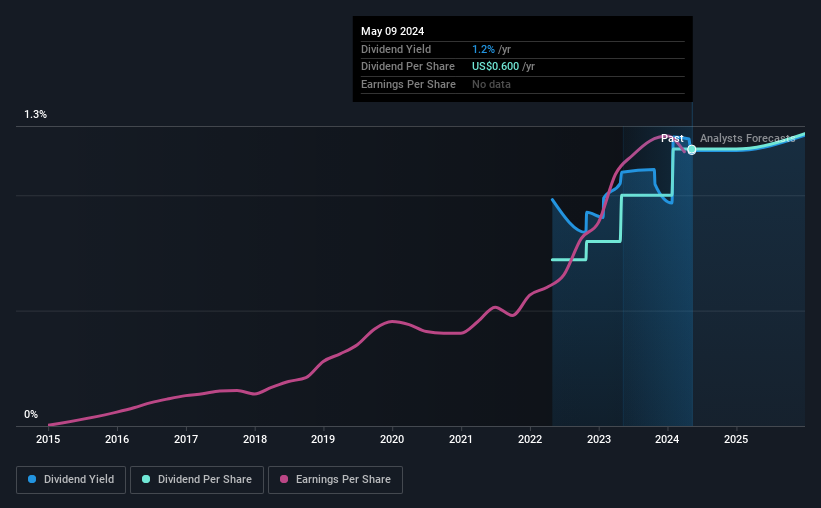Esquire Financial Holdings (NASDAQ:ESQ) Could Be A Buy For Its Upcoming Dividend
It looks like Esquire Financial Holdings, Inc. (NASDAQ:ESQ) is about to go ex-dividend in the next four days. The ex-dividend date is usually set to be one business day before the record date which is the cut-off date on which you must be present on the company's books as a shareholder in order to receive the dividend. The ex-dividend date is important as the process of settlement involves two full business days. So if you miss that date, you would not show up on the company's books on the record date. This means that investors who purchase Esquire Financial Holdings' shares on or after the 14th of May will not receive the dividend, which will be paid on the 3rd of June.
The company's upcoming dividend is US$0.15 a share, following on from the last 12 months, when the company distributed a total of US$0.60 per share to shareholders. Looking at the last 12 months of distributions, Esquire Financial Holdings has a trailing yield of approximately 1.2% on its current stock price of US$50.27. Dividends are a major contributor to investment returns for long term holders, but only if the dividend continues to be paid. As a result, readers should always check whether Esquire Financial Holdings has been able to grow its dividends, or if the dividend might be cut.
See our latest analysis for Esquire Financial Holdings
Dividends are usually paid out of company profits, so if a company pays out more than it earned then its dividend is usually at greater risk of being cut. Esquire Financial Holdings has a low and conservative payout ratio of just 10% of its income after tax.
Generally speaking, the lower a company's payout ratios, the more resilient its dividend usually is.
Click here to see the company's payout ratio, plus analyst estimates of its future dividends.
Have Earnings And Dividends Been Growing?
Stocks in companies that generate sustainable earnings growth often make the best dividend prospects, as it is easier to lift the dividend when earnings are rising. Investors love dividends, so if earnings fall and the dividend is reduced, expect a stock to be sold off heavily at the same time. It's encouraging to see Esquire Financial Holdings has grown its earnings rapidly, up 33% a year for the past five years.
Another key way to measure a company's dividend prospects is by measuring its historical rate of dividend growth. Esquire Financial Holdings has delivered an average of 29% per year annual increase in its dividend, based on the past two years of dividend payments. It's great to see earnings per share growing rapidly over several years, and dividends per share growing right along with it.
Final Takeaway
Should investors buy Esquire Financial Holdings for the upcoming dividend? When companies are growing rapidly and retaining a majority of the profits within the business, it's usually a sign that reinvesting earnings creates more value than paying dividends to shareholders. Perhaps even more importantly - this can sometimes signal management is focused on the long term future of the business. We think this is a pretty attractive combination, and would be interested in investigating Esquire Financial Holdings more closely.
In light of that, while Esquire Financial Holdings has an appealing dividend, it's worth knowing the risks involved with this stock. To help with this, we've discovered 1 warning sign for Esquire Financial Holdings that you should be aware of before investing in their shares.
If you're in the market for strong dividend payers, we recommend checking our selection of top dividend stocks.
Have feedback on this article? Concerned about the content? Get in touch with us directly. Alternatively, email editorial-team (at) simplywallst.com.
This article by Simply Wall St is general in nature. We provide commentary based on historical data and analyst forecasts only using an unbiased methodology and our articles are not intended to be financial advice. It does not constitute a recommendation to buy or sell any stock, and does not take account of your objectives, or your financial situation. We aim to bring you long-term focused analysis driven by fundamental data. Note that our analysis may not factor in the latest price-sensitive company announcements or qualitative material. Simply Wall St has no position in any stocks mentioned.

